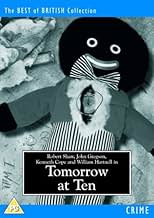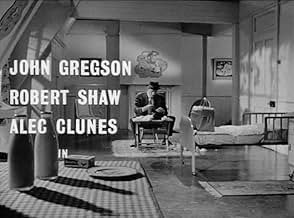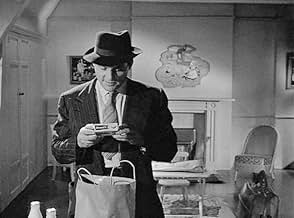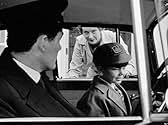VALUTAZIONE IMDb
6,7/10
524
LA TUA VALUTAZIONE
Aggiungi una trama nella tua linguaIt's a race against time for the police when they have to find a kidnapped boy imprisoned with a time bomb, after his abductor dies without revealing the child's whereabouts.It's a race against time for the police when they have to find a kidnapped boy imprisoned with a time bomb, after his abductor dies without revealing the child's whereabouts.It's a race against time for the police when they have to find a kidnapped boy imprisoned with a time bomb, after his abductor dies without revealing the child's whereabouts.
Recensioni in evidenza
The most telling points of this neat little British second feature, are the strong cast of Shaw, Gregson, Clunes, Wheatley and Cope, allied with a lively script and tight direction from Lance Comfort. The plot is tidy and unfussy and proceeds well towards its somewhat novel conclusion. Robert Shaw is excellent as the disturbed kidnapper, Marlow, and sterling support is provided by John Gregson as the police inspector. Some of the scenes are a little over the top, especially the one concerning the dancers in the nightclub, which by today's standards is quite hilarious! Not a classic by any means, but well worth watching in any event.
When I watch a film like TOMORROW AT TEN, I'm a bit bemused because I can't understand why it's not better known. This is a cracking little thriller, one of the best of its era, and it really should be talked about today by film fans instead of being forgotten by all but the most dedicated viewers of the era. It's a pity that B-movie thrillers like this one are so little known as this sort of film more than holds its own against modern fare.
There's no padding or fat in this story which gets going from the outset. A delightfully mannered Robert Shaw (on the cusp of stardom in FROM Russia WITH LOVE, although TOMORROW AT TEN was made in 1962 and not released until 1965) plays a kidnapper who abducts the son of a rich businessman and locks him in a room with a bomb hidden inside a Golliwog. The boy's father and a local detective inspector must negotiate before the bomb explodes - 'tomorrow at ten'.
It's a great concept and the experienced director Lance Comfort makes a fine job of it. There's suspense in spades here, alongside plot twists you won't see coming and a delightfully tense race-against-the-clock (literally!) climax. The supporting cast includes notable roles for Kenneth Cope, Alec Clunes (father of Martin), Harry Fowler, William Hartnell, and Renee Houston. John Gregson's long-suffering detective inspector is one of the most sympathetic of his career.
There's no padding or fat in this story which gets going from the outset. A delightfully mannered Robert Shaw (on the cusp of stardom in FROM Russia WITH LOVE, although TOMORROW AT TEN was made in 1962 and not released until 1965) plays a kidnapper who abducts the son of a rich businessman and locks him in a room with a bomb hidden inside a Golliwog. The boy's father and a local detective inspector must negotiate before the bomb explodes - 'tomorrow at ten'.
It's a great concept and the experienced director Lance Comfort makes a fine job of it. There's suspense in spades here, alongside plot twists you won't see coming and a delightfully tense race-against-the-clock (literally!) climax. The supporting cast includes notable roles for Kenneth Cope, Alec Clunes (father of Martin), Harry Fowler, William Hartnell, and Renee Houston. John Gregson's long-suffering detective inspector is one of the most sympathetic of his career.
A chap called Marlowe (Robert Shaw, Jaws fans) kidnaps a child of Hampstead parents by posing as the school-run chauffeur. After depositing the child in a deserted mansion, that resembles the one in Fallen Idol, he calmly turns up at the parent's house demanding 50 big ones. He's planning on catching the afternoon TWA to Rio see from where he'll book a long distance call to tell dad where his kid is hid. Now here's the clever bit. If he doesn't get his dough an explosive device hidden in a Golliwog will detonate tomorrow at ten and he's given the Golliwog to the child for safekeeping.
I bought this DVD from Best of British series issued by Odeon. It's the sort of thing which used to pad out afternoon schedules in the distant days of 3 channel Britain. It's directed by Lance Comfort, who made films for RKO in the 40s and even directed James Mason once upon a time. Comfort, however, never really made a big film and subsequently became lost in the culturally reviled wasteland of second features many for Butchers Film Service. In recent years there's been an attempt to re-evaluate Comfort's work. There's even been a monograph by Brian McFarlane and one of his films was compared to Resnais on this very website no less (Pit of Darkness).
This one is not quite typical of the second feature era. For a start it's a little bit later (1964) than that. Also there are a few moments that actually remove the film from the largely sealed world of the British B movie. There's even a cute reference to Z cars as Shaw whistles the theme tune while preparing the Golliwog bomb. Incidentally, I feel that an absence of any sort of popular culture from British B's of the 1957-63 era (new towns, West Indians, jeans, the teenage industry, etc) makes them strangely representative of their era. The fashion today for film makers to drench film soundtracks with the pop music of the film's era is not only a lazy way of establishing period flavour but to me rings false. Pop music may be all pervasive now for the ipod generation, if only superficially, but how many middle aged middle class people in the 50s/ 60s had any interest in pop culture beyond a vague awareness of Elvis and the Beatles maybe?
No matter, this film features John Gregson in the lead, as Inspector Parnell investigating the kidnapping, and two stars of the future in the aforementioned Shaw and Kenneth Cope (Cope pops up at the Er Golliwog Club the way the girls are dancing here has to be seen to be believed and interrogates Renee Houston who later pops up as his battleaxe mum in Carry On At Your Convenience, trivia fans). Ironically it's Gregson as the established star who is a bit miscast here. He's called to play a maverick cop who goes against his superior, Bewley (Alan Wheatley). Unfortunately, Gregson is far too meek and mild of voice and manner to carry any conviction. The film is very much of its decade though when it pits working class cop Parnell against patrician, hunt ball brown noser Bewley, who simply wants to let Marlowe skip to Brazil with his loot. Unfortunately what could have been a rip roaring barney between the two one man embodying the 1950s and the other the 1960s has all potential drama rung out of it by the laborious manner in which Parnell explains that perhaps this wouldn't be such a great idea ("What the hell are you talking about?")
Better is the psychological stand off between Parnell and Marlowe as the Inspector tries to break Marlowe down with a seemingly innocuous line of questioning. We see a little glimpse of what a great character actor Shaw was to become; the authenticity of his behaviour and accent lifting the film momentarily out of the fusty B world into something more contemporary.
I bought this DVD from Best of British series issued by Odeon. It's the sort of thing which used to pad out afternoon schedules in the distant days of 3 channel Britain. It's directed by Lance Comfort, who made films for RKO in the 40s and even directed James Mason once upon a time. Comfort, however, never really made a big film and subsequently became lost in the culturally reviled wasteland of second features many for Butchers Film Service. In recent years there's been an attempt to re-evaluate Comfort's work. There's even been a monograph by Brian McFarlane and one of his films was compared to Resnais on this very website no less (Pit of Darkness).
This one is not quite typical of the second feature era. For a start it's a little bit later (1964) than that. Also there are a few moments that actually remove the film from the largely sealed world of the British B movie. There's even a cute reference to Z cars as Shaw whistles the theme tune while preparing the Golliwog bomb. Incidentally, I feel that an absence of any sort of popular culture from British B's of the 1957-63 era (new towns, West Indians, jeans, the teenage industry, etc) makes them strangely representative of their era. The fashion today for film makers to drench film soundtracks with the pop music of the film's era is not only a lazy way of establishing period flavour but to me rings false. Pop music may be all pervasive now for the ipod generation, if only superficially, but how many middle aged middle class people in the 50s/ 60s had any interest in pop culture beyond a vague awareness of Elvis and the Beatles maybe?
No matter, this film features John Gregson in the lead, as Inspector Parnell investigating the kidnapping, and two stars of the future in the aforementioned Shaw and Kenneth Cope (Cope pops up at the Er Golliwog Club the way the girls are dancing here has to be seen to be believed and interrogates Renee Houston who later pops up as his battleaxe mum in Carry On At Your Convenience, trivia fans). Ironically it's Gregson as the established star who is a bit miscast here. He's called to play a maverick cop who goes against his superior, Bewley (Alan Wheatley). Unfortunately, Gregson is far too meek and mild of voice and manner to carry any conviction. The film is very much of its decade though when it pits working class cop Parnell against patrician, hunt ball brown noser Bewley, who simply wants to let Marlowe skip to Brazil with his loot. Unfortunately what could have been a rip roaring barney between the two one man embodying the 1950s and the other the 1960s has all potential drama rung out of it by the laborious manner in which Parnell explains that perhaps this wouldn't be such a great idea ("What the hell are you talking about?")
Better is the psychological stand off between Parnell and Marlowe as the Inspector tries to break Marlowe down with a seemingly innocuous line of questioning. We see a little glimpse of what a great character actor Shaw was to become; the authenticity of his behaviour and accent lifting the film momentarily out of the fusty B world into something more contemporary.
A surprisingly engaging feature sees John Gregson as a detective ("Insp. Parnell") brought into investigate the kidnap of the son of the wealthy "Chester" (Alec Clunes). Interestingly the kidnapper "Marlow" (Robert Shaw) has locked the child into an attic room in an unknown London address then gone to the man's home to demand the ransom in person - so we know all the characters from the start. Midway through, he there is an altercation and suffice to say the policeman has to try and track down the child from scratch. It's quite suspenseful, and the tight-knit cast keep the story moving well with quite a degree of jeopardy building, too.
George Marlow (Robert Shaw) devises what he thinks is the perfect kidnapping. He buys a doll and places a time bomb inside of it. He then picks a day when a chauffeur who usually takes the son of a rich man to school is ill, substitutes for him, and takes the boy to a large house that he has rented. He then locks the boy in an upper story room in the house with the doll-bomb in the same room. He goes to the rich man and says he wants fifty thousand pounds or else the bomb will go off and kill his son the next day at 10AM . Marlow says he plans to get on an international flight with the money and when he arrives at the destination he will call the rich man and tell him where the boy is so he can be rescued in time.
Not knowing anything but that the boy has been kidnapped, the nanny calls the police. Detective Inspector Parnell (John Gregson) arrives and tells Marlow he is not going anywhere, bomb or no bomb. Parnell has a long success of talking to suspects until they give something away, and he has almost 24 hours to do that here. In the meantime, Parnell is being opposed by the boy's father who even offers Parnell fifty thousand pounds to let the kidnapper go and by his own police commissioner who is a close friend of the rich man. And there are a couple of ironic plot twists along the way. I don't want to say any more than that.
This film could have gotten claustrophobic in a hurry if it was just Shaw and Gregson alone in a room verbally sparring for the length of the film, and I will tell you there is much more to it than that.
Not knowing anything but that the boy has been kidnapped, the nanny calls the police. Detective Inspector Parnell (John Gregson) arrives and tells Marlow he is not going anywhere, bomb or no bomb. Parnell has a long success of talking to suspects until they give something away, and he has almost 24 hours to do that here. In the meantime, Parnell is being opposed by the boy's father who even offers Parnell fifty thousand pounds to let the kidnapper go and by his own police commissioner who is a close friend of the rich man. And there are a couple of ironic plot twists along the way. I don't want to say any more than that.
This film could have gotten claustrophobic in a hurry if it was just Shaw and Gregson alone in a room verbally sparring for the length of the film, and I will tell you there is much more to it than that.
Lo sapevi?
- QuizAbbots Mead, the disused Victorian house (referred to in the film by its real name) where Marlow takes Jonathan after he has kidnapped him, was bought by film director Stanley Kubrick shortly after this film was made. He and his family lived there from 1965-1979 and he edited many of his films, such as A Clockwork Orange, in an outbuilding alongside the house.
- BlooperWhen Parnell and Grey first meet the local police officer near Chester's house, a cylindrical microphone windshield is very obvious at the bottom of the frame.
- ConnessioniFeatured in Tienes que ver esta peli: Mañana a las 10 (2022)
I più visti
Accedi per valutare e creare un elenco di titoli salvati per ottenere consigli personalizzati
- How long is Tomorrow at Ten?Powered by Alexa
Dettagli
- Data di uscita
- Paese di origine
- Lingua
- Celebre anche come
- Tomorrow at Ten
- Luoghi delle riprese
- 91 Winnington Road, Hampstead, Londra, Inghilterra, Regno Unito(14 Winnington Road - the Chesters' house)
- Azienda produttrice
- Vedi altri crediti dell’azienda su IMDbPro
- Tempo di esecuzione1 ora 20 minuti
- Colore
- Proporzioni
- 1.37 : 1
Contribuisci a questa pagina
Suggerisci una modifica o aggiungi i contenuti mancanti




















